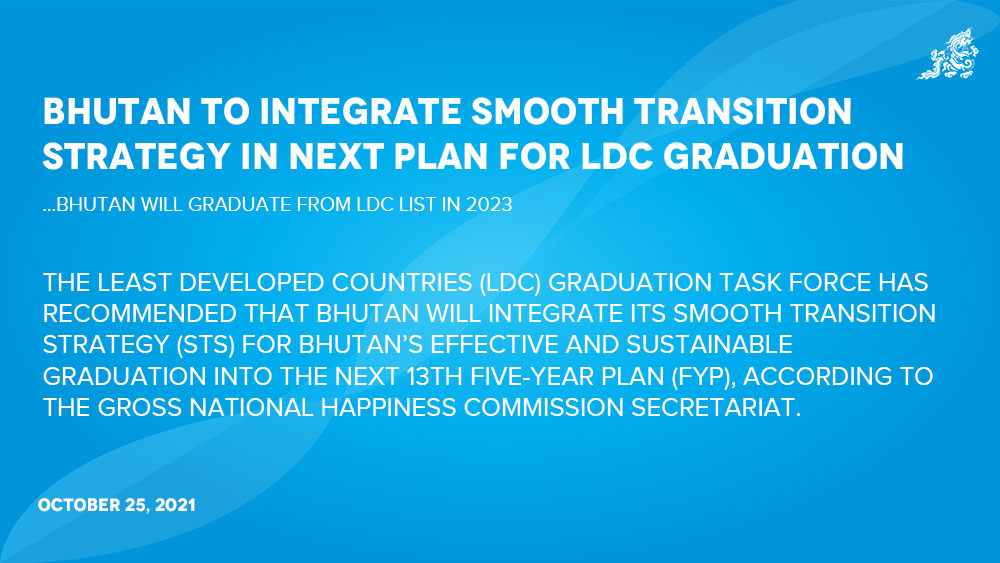…Bhutan will graduate from LDC list in 2023
Yangchen C Rinzin
The least developed countries LDC) graduation task force has recommended that Bhutan will integrate its smooth transition strategy (STS) for Bhutan’s effective and sustainable graduation into the next 13th Five-Year Plan (FYP), according to the Gross National Happiness Commission secretariat.
Bhutan will graduate from UN’s list of LDCs category in 2023, coinciding with the end of 12th FYP.
Bhutan’s graduation was endorsed during the 73rd Session of the UN General Assembly held in December 2018.
The task force has recommended that the formulation of the planning framework for the next development plan incorporate the agenda for a smooth and sustainable transition strategy to be implemented after Bhutan’s graduation.
According to the Commission’s annual report 2021, it is recommended that all graduating countries develop a STS to avoid any disruption of the graduating country’s development trajectory. The STS will help the country continue to pursue national sustainable development priorities and the 2030 development agenda.
The report stated that the STS would also help the country adjust to the phasing out of international support measures associated with being LDC, and which are currently being received.
Bhutan was found eligible for graduation in 2015 after having successfully met and fulfilled the threshold levels for the Gross National Income (GNI) per capita and Human Asset Indicator.
The report stated that Bhutan has now met all three criteria for graduation: the GNI per capita is estimated at $2,982 in 2021. “Bhutan has also successfully fulfilled the EVI criteria (environment vulnerability index with environment component), which Bhutan did not meet earlier.”
According to the report, the STS can either be a separate document, or integrated as a part of the national development plan and aid management strategies.
“The country can establish a domestic consultative mechanism that provides a forum for building national consensus on political and policy choices,” the report, which was released recently, stated. “The STS will begin or implement after Bhutan graduates, coinciding with the start of the next Plan, and Bhutan is currently in the preparation phase.”
Macroeconomic stability, expanding trade, productive capacities and economic diversification, technological advancement, and mitigating vulnerability and building resilience are some of the main themes or issues the STS would consider.
The report stated it would also consider finances and aid, including global level support measures and commitment extended to LDCs that must continue (if any) in the post-graduation period.
The Committee for Development Policy under the UN Economic and Social Council has also underscored that Bhutan has made rapid progress towards graduation.
With the graduation thresholds at 239 percent in 2020, Bhutan has demonstrated the fastest progress among non-oil exporting LDCs under the GNI per capita criterion, reflecting Bhutan’s diversification pace.
“Our investment in human capital and provision of free education and health services has contributed to improved human development, thereby outperforming the South Asian and LDC median scores on human capital,” the Commission’s report stated.
However, it was noticed that in the ICT and IT-related services, progress has been very slow despite the recognition of telecommunications and broadband internet connectivity as important contributors, and an ICT policy and strategy being in place.
As a part of the consultative mechanism and collaborative efforts to work towards developing the STS, an LDC graduation task force was formed in April 2021 led by GNHC, which includes representatives from key sectors related to Bhutan’s graduation.
The first task force meeting was convened to sensitise and understand the format and requirements of the STS, and discuss the way forward with developing the STS, according to the GNHC.
Edited by Jigme Wangchuk


